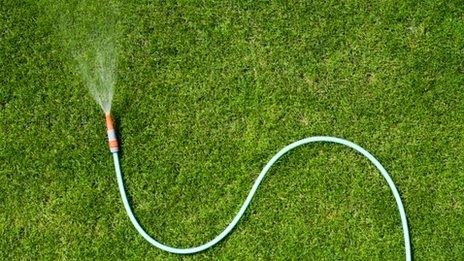Hosepipe bans brought in for drought-hit areas
- Published
- comments

The introduction of the bans follows the fifth driest March since records began in 1910
Hosepipe bans affecting about 20 million customers have been introduced by seven water authorities in parts of southern and eastern England.
People who flout the bans, which follow one of the driest two-year periods on record, face fines of up to £1,000.
Suppliers <link> <caption>Thames</caption> <altText>Thames Water temporary use ban and exemptions </altText> <url href="http://www.thameswater.co.uk/cps/rde/xchg/corp/hs.xsl/15443.htm" platform="highweb"/> </link> , <link> <caption>Southern</caption> <altText>Southern Water temporary use ban and exemptions </altText> <url href="http://www.southernwater.co.uk/Environment/WaterResourcesLatest/Drought2012FAQ.asp" platform="highweb"/> </link> , <link> <caption>South East</caption> <altText>South East Water temporary use ban and exemptions </altText> <url href="http://www.southeastwater.co.uk/pls/apex/f?p=101:536:0" platform="highweb"/> </link> , <link> <caption>Anglian</caption> <altText>Anglian Water temporary use ban and exemptions </altText> <url href="http://www.anglianwater.co.uk/E90894F6CB2546F88BFF82408F9B81CE.aspx" platform="highweb"/> </link> , <link> <caption>Sutton and East Surrey</caption> <altText>Sutton and East Surrey temporary use ban and exemptions </altText> <url href="http://www.waterplc.com/userfiles/file/Water_restriction_notice_20120405.pdf" platform="highweb"/> </link> , <link> <caption>Veolia Central</caption> <altText>Veolia Central temporary use ban and exemptions </altText> <url href="https://central.veoliawater.co.uk/docs/drought-restrictions-explained-29-March.pdf" platform="highweb"/> </link> and <link> <caption>Veolia South East</caption> <altText>Veolia South East temporary use ban and exemptions </altText> <url href="https://southeast.veoliawater.co.uk/docs/drought-restrictions-explained-29-March.pdf" platform="highweb"/> </link> have all introduced "temporary use bans".
The government has urged householders to be "smarter about how we use water".
Using a hosepipe to water a garden, water plants, fill a pond not containing fish, or clean outdoor surfaces are all banned as are filling and maintaining ornamental fountains.
But exemptions are in place for grass and surfaces used for national and international sports which means the Olympic and Paralympic games will be unaffected.
Disabled people with blue badges are exempt, while some businesses, including car washing firms, will also be allowed to continue using hosepipes in most areas.
And some drip irrigation systems featuring perforated hoses are allowed.
Water companies say they have no option but to put the bans in place to preserve essential water supplies but say they also need their customers to help cut down on their usage.
Most of the suppliers expect the ban to last all summer.
Anglian Water managing director Peter Simpson said: "Two dry winters have prevented rivers, reservoirs and aquifers from refilling with the water we treat and supply the rest of the year, especially during the hotter months when demand rises."
Sutton and East Surrey operations manager Mike Hegarty, meanwhile, warned there was no end in sight to the situation.
"We have said from the outset that we very much regret having to impose this bar but this drought is becoming increasingly serious."
He added: "We have no choice if we are to protect our customers by ensuring the long-term security of their water supply."
Leaking pipes
Thames Water sustainability director Richard Aylard said the ban could extend into the autumn "unless we have an unusually wet year".
He also said the company's leakage rates were not "obscene" but were high.
He said this was "partly a consequence of very old pipes - 20% of London's water pipes are over 150 years old".
Mr Aylard added: "With this ban we would expect to see up to 150 million litres of water a day saved. To get the same saving from replacing leaky pipes would cost £1.2bn and take 10 years, so we have to be practical about this."
Karen Gibbs, from the Consumer Council for Water, says that with providers losing billions of litres of water every day, consumers may feel the ban is unfair.
"That's obviously a perception that can affect the way people respond to these calls for water saving," she said.
"The companies should be aiming to exceed their leakage targets and when there's a drought on it's really important that they're being seen to be really stepping up their effort on leakage, so that customers can see that they are doing everything they can."
Drought areas
Householders are being urged by the companies and the government to cut their water use with measures including taking shorter showers and washing fruit and vegetables in a bowl rather than under the tap.
Southern Water's strategy manager Paul Kent said he was optimistic about people taking the ban seriously.
"We're not going to go trawling the streets, looking for people abusing the hosepipe ban. We have found from our last hosepipe ban seven years ago, that people do have a social conscience.
"Undoubtedly we will get customers that are phoning in and telling us of customers that are using hosepipes. We will contact those customers in a sensible fashion and remind them of the hosepipe ban that is in place."
In some areas, drought has left groundwater below levels in the 1976 crisis when household supplies were cut off and standpipes used.
The introduction of the bans follows the third-warmest March - and fifth driest - since records began in 1910.
Lincolnshire, Cambridgeshire, parts of Bedfordshire and Northamptonshire, and west Norfolk have been in drought since last summer.
Much of south-east England, including London, is also affected and parts of North, South and East Yorkshire have become the latest to be declared as officially in drought by the Environment Agency.
- Published16 April 2012
- Published5 April 2012
- Published5 April 2012
- Published5 April 2012
- Published5 April 2012
- Published5 April 2012
- Published3 April 2012
- Published4 April 2012
- Published23 November 2011